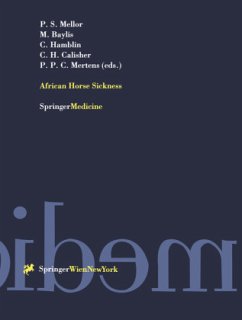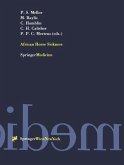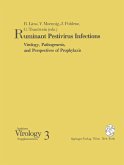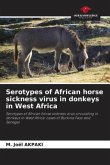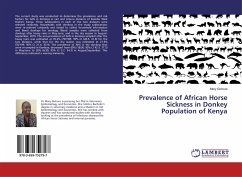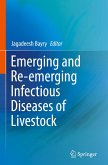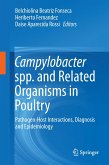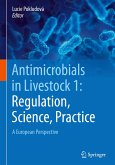- Broschiertes Buch
- Merkliste
- Auf die Merkliste
- Bewerten Bewerten
- Teilen
- Produkt teilen
- Produkterinnerung
- Produkterinnerung
African horse sickness virus is a double-stranded RNA virus which causes a non-contagious, infectious arthropod-borne disease of equines and occasionally dogs. Nine distinct, internationally recognised serotypes of the virus have so far been identified.
This book is based upon the findings of two programmes funded by the European Commission. It will be of value not only to the specialist research workers but also to veterinary workers dealing with control and to
legislators seeking to promote safe international movement of equines. The topics covered include state-of-the-art discussions…mehr
Andere Kunden interessierten sich auch für
![African Horse Sickness African Horse Sickness]() African Horse Sickness213,99 €
African Horse Sickness213,99 €![Ruminant Pestivirus Infections Ruminant Pestivirus Infections]() Ruminant Pestivirus Infections39,99 €
Ruminant Pestivirus Infections39,99 €![Serotypes of African horse sickness virus in donkeys in West Africa Serotypes of African horse sickness virus in donkeys in West Africa]() M. Joël AkpakiSerotypes of African horse sickness virus in donkeys in West Africa40,99 €
M. Joël AkpakiSerotypes of African horse sickness virus in donkeys in West Africa40,99 €![Prevalence of African Horse Sickness in Donkey Population of Kenya Prevalence of African Horse Sickness in Donkey Population of Kenya]() Mary GichurePrevalence of African Horse Sickness in Donkey Population of Kenya24,99 €
Mary GichurePrevalence of African Horse Sickness in Donkey Population of Kenya24,99 €![Emerging and Re-emerging Infectious Diseases of Livestock Emerging and Re-emerging Infectious Diseases of Livestock]() Emerging and Re-emerging Infectious Diseases of Livestock124,99 €
Emerging and Re-emerging Infectious Diseases of Livestock124,99 €![Campylobacter spp. and Related Organisms in Poultry Campylobacter spp. and Related Organisms in Poultry]() Campylobacter spp. and Related Organisms in Poultry112,99 €
Campylobacter spp. and Related Organisms in Poultry112,99 €![Antimicrobials in Livestock 1: Regulation, Science, Practice Antimicrobials in Livestock 1: Regulation, Science, Practice]() Antimicrobials in Livestock 1: Regulation, Science, Practice119,99 €
Antimicrobials in Livestock 1: Regulation, Science, Practice119,99 €-
-
-
African horse sickness virus is a double-stranded RNA virus which causes a non-contagious, infectious arthropod-borne disease of equines and occasionally dogs. Nine distinct, internationally recognised serotypes of the virus have so far been identified.
This book is based upon the findings of two programmes funded by the European Commission. It will be of value not only to the specialist research workers but also to veterinary workers dealing with control and to
legislators seeking to promote safe international movement of equines. The topics covered include state-of-the-art discussions on diagnostics, vaccines, molecular biology, vector studies, and epidemiology.
This book is based upon the findings of two programmes funded by the European Commission. It will be of value not only to the specialist research workers but also to veterinary workers dealing with control and to
legislators seeking to promote safe international movement of equines. The topics covered include state-of-the-art discussions on diagnostics, vaccines, molecular biology, vector studies, and epidemiology.
Produktdetails
- Produktdetails
- Archives of Virology. Supplementa 14
- Verlag: Springer / Springer Vienna / Springer, Wien
- Artikelnr. des Verlages: 978-3-211-83132-8
- 1998.
- Seitenzahl: 356
- Erscheinungstermin: 16. September 1998
- Englisch
- Abmessung: 279mm x 210mm x 20mm
- Gewicht: 855g
- ISBN-13: 9783211831328
- ISBN-10: 3211831320
- Artikelnr.: 09204111
- Herstellerkennzeichnung
- Springer-Verlag KG
- Sachsenplatz 4-6
- 1201 Wien, AT
- ProductSafety@springernature.com
- Archives of Virology. Supplementa 14
- Verlag: Springer / Springer Vienna / Springer, Wien
- Artikelnr. des Verlages: 978-3-211-83132-8
- 1998.
- Seitenzahl: 356
- Erscheinungstermin: 16. September 1998
- Englisch
- Abmessung: 279mm x 210mm x 20mm
- Gewicht: 855g
- ISBN-13: 9783211831328
- ISBN-10: 3211831320
- Artikelnr.: 09204111
- Herstellerkennzeichnung
- Springer-Verlag KG
- Sachsenplatz 4-6
- 1201 Wien, AT
- ProductSafety@springernature.com
Epidemiology.- Taxonomy of African horse sickness viruses.- Epidemiology of African horse sickness and the role of the zebra in South Africa.- Transmission and distribution of African horse sickness virus serotypes in South African zebra.- Serological and virological responses in mules and donkeys following inoculation with African horse sickness virus serotype 4.- Donkeys as reservoirs of African horse sickness virus.- Clinical, virological and immune responses of normal and immunosuppressed donkeys (Equus asinus africanus) after inoculation with African horse sickness virus.- Immunohistochemical demonstration of African horse sickness viral antigen in tissues of experimentally infected equines.- Entomology.- The 1996 outbreak of African horse sickness in South Africa - the entomological perspective.- The seasonal and geographical distribution of Culicoides imicola, C. pulicaris group and C. obsoletus group biting midges in central and southern Spain.- The relationship between climate and the distribution of Culicoides imicola in Iberia.- Simulation studies of African horse sickness in Spain.- The Culicoides vectors of African horse sickness virus in Morocco: distribution and epidemiological implications.- Studies of the mortality rate of Culicoides imicola in Morocco.- Modelling the distribution and abundance of Culicoides imicola in Morocco and Iberia using climatic data and satellite imagery.- Effect of temperature on African horse sickness virus infection in Culicoides.- Duration of repellency of various synthetic and plant-derived preparations for Culicoides imicola, the vector of African horse sickness virus.- Molecular biology.- New generation of African horse sickness virus vaccines based on structural and molecular studies of the virus particles.- Expressionof the major core structural proteins VP3 and VP7 of African horse sickness virus, and production of core-like particles.- VP7 from African horse sickness virus serotype 9 protects mice against a lethal, heterologous serotype challenge.- Molecular epidemiology of African horse sickness virus based on analyses and comparisons of genome segments 7 and 10.- Structural studies of orbivirus particles.- Characterization of two African horse sickness virus nonstructural proteins, NS1 and NS3.- Development of a mouse model system, coding assignments and identification of the genome segments controlling virulence of African horse sickness virus serotypes 3 and 8.- Phylogenetic analysis of African horse sickness virus segment 10: sequence variation, virulence characteristics and cell exit.- Vaccines and diagnosis.- Future international management of African horse sickness vaccines.- Application of an indirect fluorescent antibody assay for the detection of African horse sickness virus antibodies.- Validation of ELISA for the detection of African horse sickness virus antigens and antibodies.- Use of reverse transcriptase-polymerase chain reaction (RT-PCR) and dot-blot hybridisation for the detection and identification of African horse sickness virus nucleic acids.- Western immunoblotting as a method for the detection of African horse sickness virus protein-specific antibodies: Differentiation between infected and vaccinated horses.- Conclusions and recommendations of the meeting.
Epidemiology.- Taxonomy of African horse sickness viruses.- Epidemiology of African horse sickness and the role of the zebra in South Africa.- Transmission and distribution of African horse sickness virus serotypes in South African zebra.- Serological and virological responses in mules and donkeys following inoculation with African horse sickness virus serotype 4.- Donkeys as reservoirs of African horse sickness virus.- Clinical, virological and immune responses of normal and immunosuppressed donkeys (Equus asinus africanus) after inoculation with African horse sickness virus.- Immunohistochemical demonstration of African horse sickness viral antigen in tissues of experimentally infected equines.- Entomology.- The 1996 outbreak of African horse sickness in South Africa - the entomological perspective.- The seasonal and geographical distribution of Culicoides imicola, C. pulicaris group and C. obsoletus group biting midges in central and southern Spain.- The relationship between climate and the distribution of Culicoides imicola in Iberia.- Simulation studies of African horse sickness in Spain.- The Culicoides vectors of African horse sickness virus in Morocco: distribution and epidemiological implications.- Studies of the mortality rate of Culicoides imicola in Morocco.- Modelling the distribution and abundance of Culicoides imicola in Morocco and Iberia using climatic data and satellite imagery.- Effect of temperature on African horse sickness virus infection in Culicoides.- Duration of repellency of various synthetic and plant-derived preparations for Culicoides imicola, the vector of African horse sickness virus.- Molecular biology.- New generation of African horse sickness virus vaccines based on structural and molecular studies of the virus particles.- Expressionof the major core structural proteins VP3 and VP7 of African horse sickness virus, and production of core-like particles.- VP7 from African horse sickness virus serotype 9 protects mice against a lethal, heterologous serotype challenge.- Molecular epidemiology of African horse sickness virus based on analyses and comparisons of genome segments 7 and 10.- Structural studies of orbivirus particles.- Characterization of two African horse sickness virus nonstructural proteins, NS1 and NS3.- Development of a mouse model system, coding assignments and identification of the genome segments controlling virulence of African horse sickness virus serotypes 3 and 8.- Phylogenetic analysis of African horse sickness virus segment 10: sequence variation, virulence characteristics and cell exit.- Vaccines and diagnosis.- Future international management of African horse sickness vaccines.- Application of an indirect fluorescent antibody assay for the detection of African horse sickness virus antibodies.- Validation of ELISA for the detection of African horse sickness virus antigens and antibodies.- Use of reverse transcriptase-polymerase chain reaction (RT-PCR) and dot-blot hybridisation for the detection and identification of African horse sickness virus nucleic acids.- Western immunoblotting as a method for the detection of African horse sickness virus protein-specific antibodies: Differentiation between infected and vaccinated horses.- Conclusions and recommendations of the meeting.

